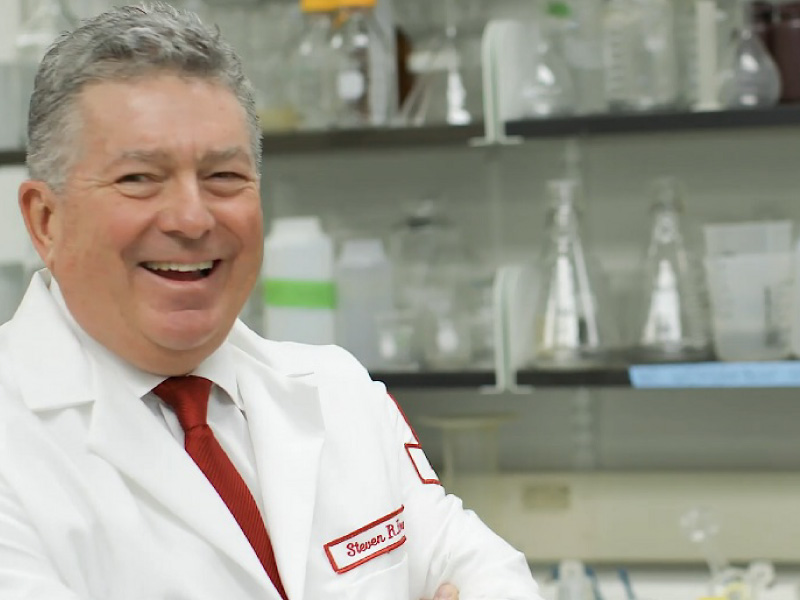Researcher celebrated for dedication to innovative science, next generation of investigators

Cardiovascular researcher Steven Houser relishes a lively scientific debate. He delights in the career successes of former students in his lab. And he lives to learn.
As a basic scientist, that's meant he's continually evolved to stay on the leading edge of his field. And as an American Heart Association volunteer for decades — topped off by his presidency of the organization in 2016-17 — he's looked far beyond lab research to understand and advance other ways to fight heart disease and stroke.
Throughout his career, Houser has propelled AHA innovations in heart and brain science. As president, he also helped confront health equity issues, exported the AHA's mission globally and boosted programs that improve the quality of heart and stroke care. For those and other contributions, he will receive a Gold Heart Award, the AHA's highest volunteer honor, during the annual National Volunteer Awards ceremony on Tuesday.
"It's wonderful to be honored by the AHA because I love the organization," said Houser, director of the Cardiovascular Research Center and senior associate dean of research at Temple University in Philadelphia. "It's had such a positive impact on my career and my life."
Jump-starting a young investigator
As a newly hired assistant professor at Temple in the late 1970s, Houser applied to the AHA's Philadelphia chapter for a peer-reviewed grant to seed his research. His first grant allowed him to collect data to support an application for National Institutes of Health funding.
"So the AHA got me started," he said.
Not long after, a member of the local peer review committee asked him to become an AHA member. His acceptance was the beginning of more than three decades of service.
Over the years, Houser — who grew up in Magnolia, New Jersey, near Philadelphia — has filled numerous committee roles; was a board member, vice president and president for the former Southeastern Pennsylvania Affiliate; and led the AHA's Council on Basic Cardiovascular Sciences, Strategic Planning Committee and Research Committee.
As president, he embraced the AHA's steady commitment to training the next generation of investigators and was particularly proud to play a vital role in shaping and advancing scientific initiatives. These include:
- The AHA's Strategically Focused Research Networks, which are multi-institutional teams working on single AHA-funded research priorities such as women's health, obesity and children's health.
- One Brave Idea, a $75 million award from the AHA, Verily Life Sciences and AstraZeneca, with pillar support from Quest Diagnostics, to pursue a breakthrough in preventing and curing heart disease. Project scientists are trying to understand the earliest forms of heart disease so later tissue and organ damage can be avoided.
- The AHA Institute for Precision Cardiovascular Medicine and data-based research approaches, to devise ways to gather, manage and analyze large volumes of clinical, biomedical and other scientific data to uncover new treatment targets or other scientific insights.
- A focus on brain health, which has grown into the $43 million AHA-Allen Initiative in Brain Health and Cognitive Impairment. The goal is to learn how to better prevent, detect and treat age-related mental decline, including Alzheimer's disease.
A career of discovery
At Temple, Houser is also chair of the physiology department and a professor of physiology and medicine at the medical school. Yet he didn't even start out to be a cardiovascular researcher.
As a doctoral student at Temple, he was on his way to becoming a neuroscientist when his father fell severely ill. Complications had developed from a major, earlier heart attack that had gone unrecognized. His dad, who was in heart failure, died about 18 months later at age 51.
Houser, in his mid-20s, immersed himself in learning about heart attack and how it transforms the heart, including its impact on cardiomyocytes, the cells that make the heart beat. He switched his thesis project to focus on basic cardiac electrophysiology.
"That's what got me interested in heart failure," he said of his father's illness. Houser was — and is — interested in how to make cardiomyocytes stronger so they can better pump blood.
And he's also still at Temple in part due to his father — who, when he knew he wouldn't live much longer, asked his only son to stay near and look after the rest of the close-knit family.
Over the years, Houser became a leader in advancing fundamental understanding of heart cell function. His work shed light on calcium's role in normal and diseased cardiomyocytes and how the heart weakens and fails.
Next, he set his sights on how to repair or limit damage after a heart attack. He's explored potential stem cell, gene and drug therapies with that goal in mind.
While those topics remain of interest, lately he's added another area to his research portfolio: heart failure with preserved ejection fraction. The condition accounts for half the people with heart failure but lacks impactful therapies.
"Once you kill parts of the heart, it's very difficult to rescue; you've lost part of the muscle," Houser said. But in this form of heart failure, the cardiomyocytes are still there — giving him hope that other factors that could be causing the condition are treatable.
When his research career winds down, he'd like to add another chapter to his long fight against heart disease: teaching others how to prevent it.
Fixing hearts that don't have enough myocytes is one way to help people live longer, Houser said. "But teaching people how to live their lives so they don't lose their myocytes might be a better strategy."





